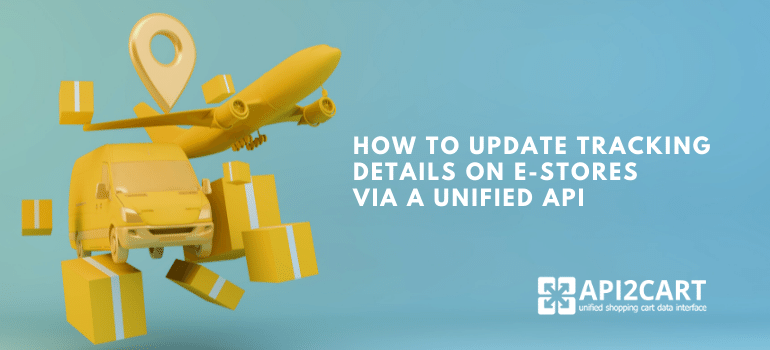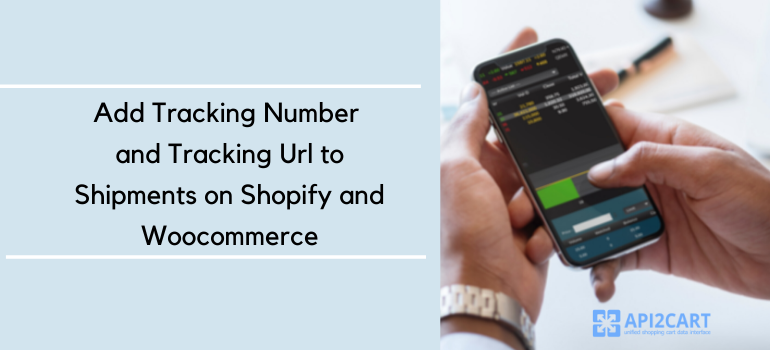
An eCommerce business can survive and thrive in the market only if its customers are satisfied with their purchase. From adding products to the cart, placing orders, making payment, receiving tracking URLs/numbers, and finally getting the product delivered - the efficiency of the entire process decides whether the customer is loyal or not. To keep customers engaged and informed about their products, it is important to update tracking details across the online stores.
For you as an eCommerce software vendor, it becomes all the more important to help your clients update tracking information on all the eCommerce platforms they have their stores built on. Tracking URLs and tracking numbers are essential for the e-store owners to give updates about orders to their customers. With such information, the customers and the store owners will be aware of a product’s location and the time it would take to reach the customer. If e-store owners do not update tracking details on their stores across the eCommerce platforms, it will hamper customer experience and the overall business reputation as the e-retailers won’t be able to take necessary decisions for missed product shipments.
Which B2B Software Providers Need to Update Tracking Details?
Updating tracking information plays a pivotal role in managing an eCommerce business. If you are a software vendor dealing in solutions like shipping management, order and inventory management, warehouse management, dropshipping, and ERP, you need shipment tracking for your systems to operate seamlessly and provide their functionality to your clients. Take a look at how these systems use shipment and tracking information.
Shipping management software
As obvious it is, shipment and tracking information is like fuel to run shipping management software. The software needs such information to ensure that the product is delivered to the right customer and at the right time.
Tracking URLs and numbers help the software update the store owner about a product’s location.
Order and inventory management software
Order and inventory management systems need shipment and tracking information to import orders from the sales channels and track their status throughout their journey. This way the order management system can track placed orders, canceled orders, carts, and other related information.
Similarly, inventory management systems use tracking information to update the status of a product’s availability across all the stores. Hence, as software vendors, you need to update tracking details for such software so they can track products and notify online shoppers on time.
Warehouse management system
Warehouse management systems need shipment and tracking information to ensure that the product orders are in stock and delivered right to the customers in the first place itself. Delivery persons, shipment routes, and putaways are all managed by WMS when it has accurate tracking details for the product.
Shipment and tracking information allow WMS to organize warehouse operations, track products, increase order fulfillment speed and accuracy and perform accurate inventory updates.
Dropshipping software
Dropshipping systems solely rely on shipment and tracking information to make their business model successful. Right from placing orders to delivering the product, the customers depend on dropshipping businesses. Hence, the software needs to update tracking details accurately so it can provide consistent product updates to its customers, too.
Shipment and tracking information allow dropshipping systems to upload product data, update order statuses, and auto-sync inventory levels across various sales channels. Moreover, dropshipping systems can also get and sync product information, prices, customers, categories, and more.
ERP software
ERP systems use the product database and barcode details to check on delivery dates and track shipment status in real-time. Therefore, they allow e-retailers to monitor their eCommerce operations through one dashboard and generate reports, making the business all the easier to manage. For all such operations, ERP systems need to update tracking details so they can use accurate information to use for reports and to update online customers.
Why B2B SaaS Companies Depend on eCommerce Integration?
No matter how advanced your eCommerce software is, if it cannot access data from client stores across eCommerce platforms, it cannot provide necessary functionality to the e-retailers. To function seamlessly, such software needs to integrate with eCommerce platforms like Amazon, eBay, Shopify, Magento, WooCommerce, BigCommerce, and more. Such a connection allows updating tracking details and other related information on the client stores.
Given the need for eCommerce integration, most of the SaaS companies try to develop integration in-house. The process may sound more controlling but it has pitfalls associated with it.
Integration is a complex process. Every eCommerce platform has a unique architecture and requires advanced developers to develop the integration. Such developers are hard to find and train.
Given the complexity, integrations are time-consuming. It may take you 4 to 8 months to develop one integration. If you try to build multiple integrations for all clients, the process seems never-ending.
On top of everything, integrations are costly. You have to pay more than 4000 dollars for every integration. Multiply the amount with the number of integrations you develop every time for your clients. Added are the costs of hiring, training, and onboarding developers, setting up infrastructure, and resources required to develop the integration.
Integrations require consistent upgrading and maintenance as eCommerce platforms keep updating their APIs. The maintenance adds up further to the time, money, and complexity involved in the integration process.
Therefore, you can now observe the challenges associated with setting up integration even for small operations like updating tracking details.
How to Easily Add an Update tracking Info via API2Cart?
The easiest way to integrate with eCommerce platforms and update tracking details on client stores is by using API2Cart.
Its unified API allows B2B SaaS companies to connect with 60+ shopping carts and marketplaces in one go. It offers more than 100 API methods to retrieve and manage data related to orders, products, customers, shipments, etc.
To add/update tracking details easily on e-stores API2Cart provides the following API methods:
order.shipment.add - This method allows software vendors to add all the shipment associated with an order.
order.shipment.update - With this method, the software vendors can update the shipments related to an order to the client stores.
order.shipment.tracking.add - Using this method, you can add tracking URLs and tracking numbers to all the shipments.
You can try out these and other supported methods by registering a free 14-day account. In case you have some questions about how API2Cart works, contact us and we will gladly help you.



